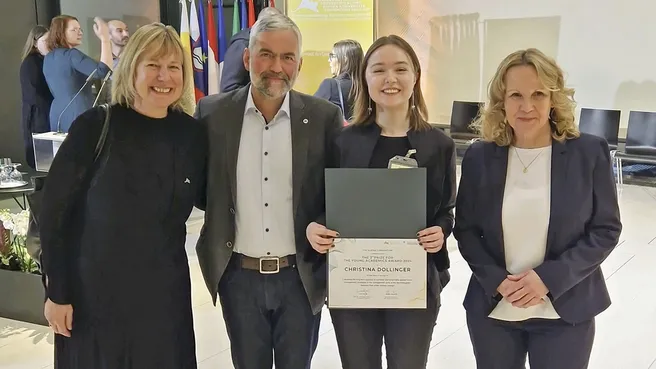The study area for the Master's thesis in biology was in the conservation zone of the Berchtesgaden National Park. Humans do not actually intervene in the development of the flora and fauna of a national park. One exception is the management zone: it makes up a quarter of the total area and extends over an altitude of 600 to 1400 meters. The management zone is currently still dominated by Norway spruce (Picea abies), which used to be planted as timber. However, the spruce is not well adapted to climate change, suffers from the bark beetle and is very susceptible to storm damage. The aim now is to restore near-natural mixed mountain forests that are less susceptible. This means increasing the proportion of copper beech (Fagus sylvatica) and silver fir (Abies alba).
Christina Dollinger used the “iLand” simulation model to investigate what effects such a forest conversion could have on the composition and structure of the forest over the next 80 years. She compared three different forest restoration strategies:
- Proactive restoration: planting beech and silver fir in disturbance gaps and in holes
- Reactive restoration: planting beech and silver fir only in disturbance gaps
- Passive restoration: no planting
“All simulated strategies led to an increase in beech and silver fir and more structural diversity, but differed in terms of the speed of these developments,” explains Dollinger.
National Park Director Dr. Roland Baier emphasizes the practical significance of the final thesis: “We have transferred the results directly into our forest management. By integrating natural processes into forest development, we can achieve even greater closeness to nature and thus protect biodiversity in the national park.”
Prof. Rupert Seidl supervised the English-language master's thesis and explains: “Her results show that we need to consider the effects of climate change in the restoration of ecosystems and underline that our mountain forests are highly adaptable even without human intervention.” Dollinger has been a doctoral student at Seidl's Chair of Ecosystem dynamics and forest management in mountain landscapes since 2022 and continues her research in Berchtesgaden National Park, as well as in Shiretoko National Park (Japan) and Grand Teton National Park (USA).
The Young Academics Award of the Alpine Convention is presented every two years. It recognizes outstanding master's theses on relevant Alpine topics. Young researchers from the eight Alpine states (Switzerland, France, Italy, Austria, Slovenia, Germany, Liechtenstein, Monaco) are eligible to apply.
The award is based on an initiative of the Slovenian Presidency of the Alpine Convention and is supported by international organizations. At an event in Brdo as part of the XVIII. Alpine Conference, Federal Environment Minister Steffi Lemke presented the award to Christina Dollinger (see picture).
More information on Dollingers research: Climate change accelerates ecosystem restoration in the mountain forests of Central Europe
